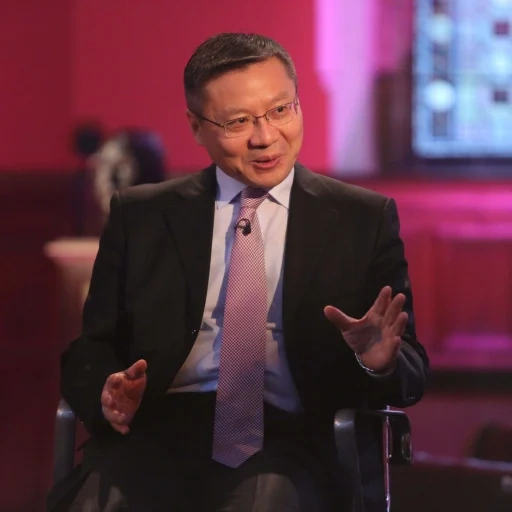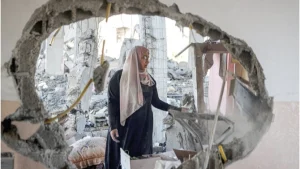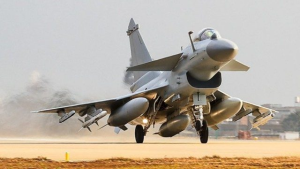The Syrian Upheaval, a Dispatch from the Doha Forum
I am currently attending the Doha Forum in Qatar. Today is December 8th, and it’s 11 a.m. The development of the situation in Syria has drawn significant attention. Before attending this forum, we assumed the focus might be on the Arab-Israeli conflict. However, upon arriving, Syria’s rapidly evolving situation made it relevant in the forum and its sub-forums. This is actually a good thing, as the geopolitical location of the Doha Forum in the Middle East naturally lends itself to tremendous concern for Syria and can hence provide us with firsthand insights into the situation.
As of this morning, we’ve seen that the opposition forces (HTS) have already taken the capital, Damascus. President Assad has reportedly fled by plane and the Prime Minister has called for calm and expressed willingness to transfer power to representatives elected by the people.

Several discussions in this forum are directly related to the developments in Syria. For instance, yesterday at 3:30 p.m., Russian Foreign Minister Sergey Lavrov engaged in a 45-minute dialogue with an Al Jazeera host, addressing numerous issues, many of which concerned Syria.
The host began by asking Mr. Lavrov about Russia’s view on the latest developments, including the fall of cities like Homs. Mr. Lavrov responded by stating that he will not join the guessing game about who is winning. He emphasized that Russia’s focus remains on a political resolution based on UN Security Council Resolution 2254, ensuring Syria’s territorial integrity, sovereignty, and independence from foreign interference, and seeking a political solution.
Upon hearing this, I felt that Russia may be giving up on the Assad regime, and his observation was made yesterday afternoon (December 7th)and there could be various reasons for this. One important reason, as a Chinese saying goes, is that “Heaven helps those who help themselves.” It is only when one possesses the will, the strength, and determination to move on, that external support can really be useful.
The Assad’s situation stems from Syria being part of the Islamic world, where Assad and his Alawite sect, a minority within the Shia branch of Islam, align closely with Iran. Yet, 85% of Syria’s population is Sunni. During French colonial rule, the Alawites, known for their combat prowess, were often recruited as soldiers and even promoted to significant ranks. This tradition carried over into the Assad regime’s 50-year rule. When I visited Syria in the 90s, the country seemed to be on the same developmental level as China, with Damascus leaving me with the impression of a bustling Chinese town. It was the Arab Spring which triggered a civil war, and eventually turned into an “Arab Winter,” resulting in over 12 million displaced Syrians, countless deaths, and a society devolving from relative prosperity to a kind of hell on earth.
Without the help of Russia and Iran, Assad’s regime would not have stabilized. This is common knowledge among many Syrians, including some Sunni friends I’ve spoken to, who agree that external support was critical for the regime’s survival, and then things have changed now.
During the forum, the host asked Mr. Lavrov about the UNSC resolution 2254 which requires a free and fair election. Mr. Lavrov emphasized that there are other prerequisites, such as sovereignty, territorial integrity, and political solutions, which must first be met before election can be held. I consider his response powerful and thought-provoking.
Israel is certainly aiming to support anti-government forces as a means to curb Hezbollah’s growth, which is a key part of the “Shiite Crescent”, for one thing, Syria was viewed to serve as an important channel for supplying weapons to Hezbollah. Israel likely provides support to the rebels, including intelligence and other forms of assistance.
Turkey, on the other hand, is also widely regarded as a major backer of the opposition forces. This is largely due to Turkey’s Kurdish issue, as the Kurds are an ethnic group seeking independence and have a significant presence in neighboring countries from Iraq to Syria, controlling approximately 20% of Syrian territory. Turkey’s actual objective may well be to suppress the Kurdish force through its support of the opposition forces. Ultimately, Turkey may even harbor territorial ambitions, not ruling out the possibility of annexing this 20% of Syrian land.
As far as the U.S. is concerned, although HTS is on its terrorist organization list, American media like CNN recently interviewed its leader, which may indicate a shift in American stance. Stirring up a crisis in Syria could be the U.S.’s strategy to divert Russia’s attention from the war in Ukraine, where the U.S. is under tremendous pressure. Additionally, the Syrian crisis could help the U.S. weaken Iran’s influence, a major regional threat that has long annoyed the U.S.
Among powers outside Syria, Iran might suffer the greatest setback from the fall of the Assad regime, which has long been a staunch supporter of Shia factions. However, it’s crucial to note that HTS is defined as a terrorist organization by the UN, the U.S., and most countries. Although its may change in one way or another, its roots as an offshoot of al-Qaeda underscore its ideological belief. Europe, too, fears a lot that a HTS-led Syria could exacerbate issues like migration and terrorism in Europe.
While some might celebrate Assad’s downfall as a victory for democracy, the long-term threat posed by terrorism remains extremely high. History has shown how U.S. Counter-terrorism efforts often backfire, creating more extremism, as seen with al-Qaeda, ISIS, and now the HTS, all of which have complex ties to Western countries.
During the forum, I shared China’s counter-terrorism approach. I contrasted Xinjiang’s stability and prosperity with the chaos in the Middle East, and China’s model of peace, development, and stability played a major role in this regard. For example, the Taklamakan Desert with an area as large as 330,000 square kilometers, or roughly one and a half of the United Kingdom has been encircled by a vast green belt, and it will be transformed into a hub for abundant renewable energy development. Many found this case compelling. China’s counter-terrorism model addresses both symptoms and root causes, a critical factor for sustainable peace.
Editor: Zhongxiaowen




Anonymous
Analyse très intelligente
play aviator
This website, you can find a great variety of casino slots from famous studios.
Players can enjoy classic slots as well as new-generation slots with high-quality visuals and interactive gameplay.
Whether you’re a beginner or an experienced player, there’s something for everyone.
money casino
Each title are ready to play round the clock and designed for PCs and smartphones alike.
You don’t need to install anything, so you can jump into the action right away.
Site navigation is user-friendly, making it quick to find your favorite slot.
Register now, and enjoy the world of online slots!